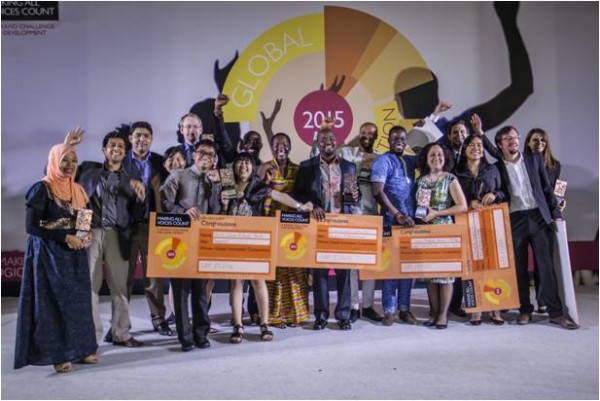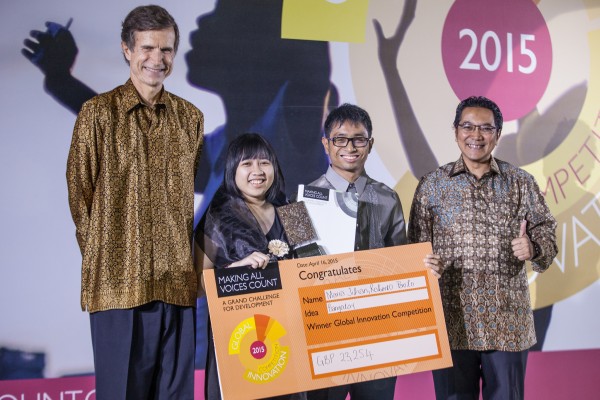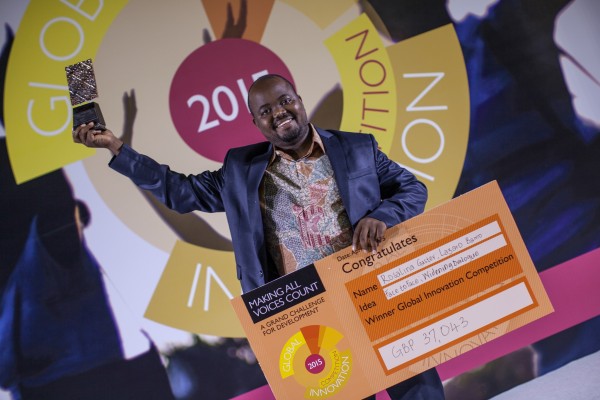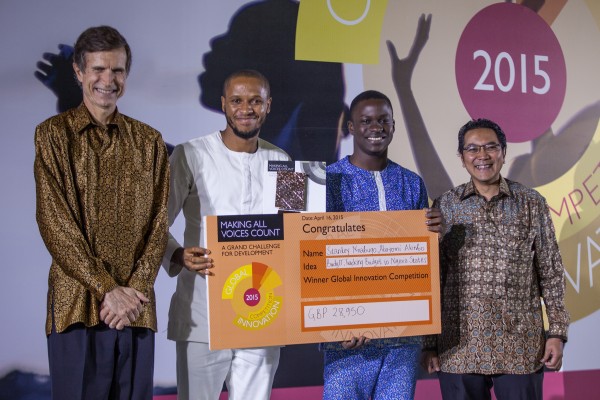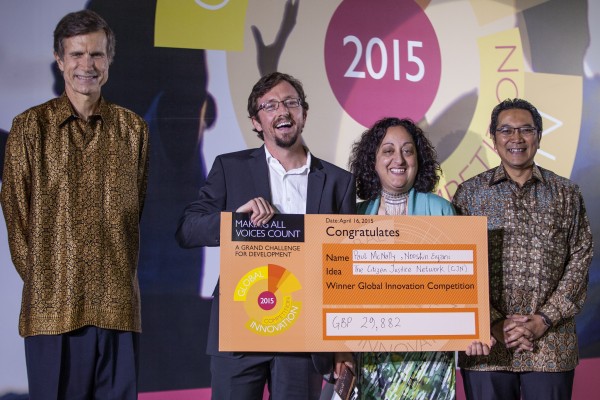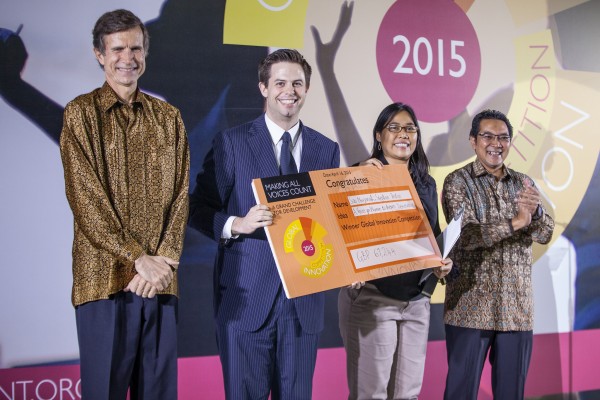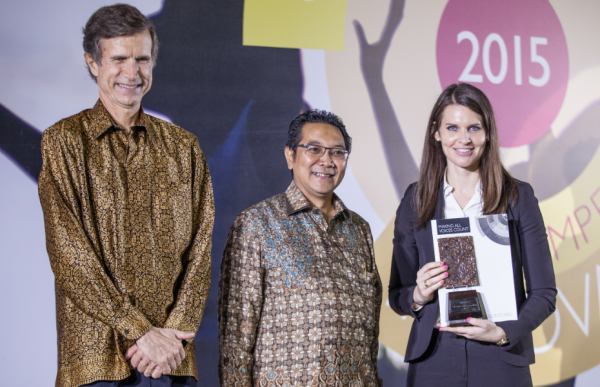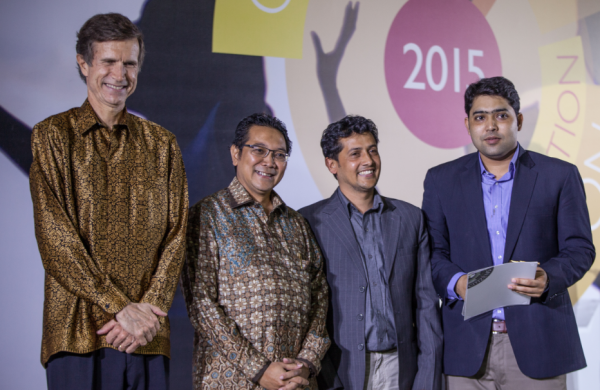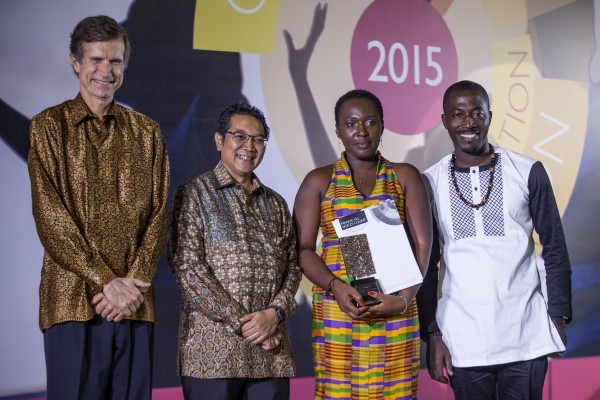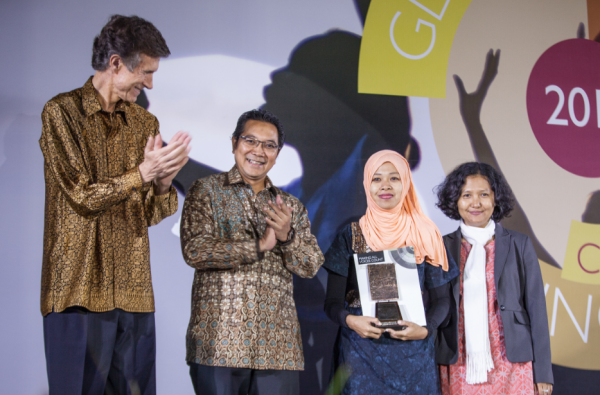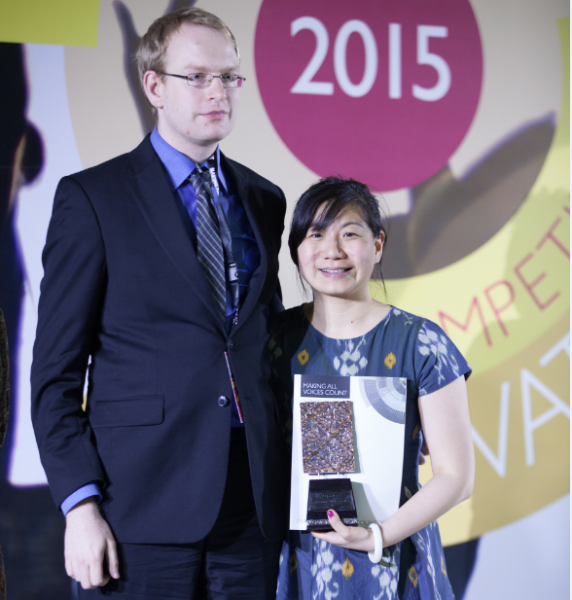Earlier this month, at the Global Innovation Gala Night in Jakarta, ten teams of innovators from across Africa and Asia pitched their ideas on how technology can improve the relationships that ordinary people have with those in power.
The night was the final of the 2015 Global Innovation Competition, run by Making All Voices Count, which called for innovative ideas to promote transparency, fight corruption, empower marginalised groups.
Over the last six months, these final ten teams have had their ideas reviewed by the public, by each other, by the Making All Voices Count team and finally, by the Jury.
If you’ve ever had to stand up and pitch an idea in three minutes to a room full of peers, press, a range of dignitaries and the US Ambassador – and do it in a language that is not your mother tongue – you’ll know how these finalists felt. If you’ve never been asked to do such a thing, you can only imagine how hard it is.
They were nervous, but they pulled it off: dramatic pauses from the Indonesian team working on Climate Change; personal stories of loss from the Philippines presenter, working on improved disaster management; and loud, passionate arguments from the Nigerian team, tracking budget spending through an online monitoring system.
The five gold winners represented Indonesia, Philippines, Mozambique, Nigeria and South Africa. They will go on to receive grants and 6 months of mentoring from the programme.
Talented teams from Pakistan, Kenya and Ghana won silver prizes, while ideas in development from Indonesia and Bangladesh took the bronze category.
What happens next?
For the gold and silver teams, there’s work to be done with Making All Voices Count’s programme officers – for gold, finalising budgets and work plans; for silver, developing their ideas towards potential funding.
The bronze teams had a week of intense mentoring and support not only from the Global Innovation Competition staff, but also from each other, and will go away with ideas to strengthen their projects.
Why is the Global Innovation Competition special?
It’s not just a competition. It’s a collaboration.
The GIC is a chance for teams from a huge global organisation like LexisNexis to sit down with a volunteer network on climate change. It’s a process that brings people from all ages (there was a 35 year age gap between our youngest and oldest finalist!) and all parts of the world together in a space where they can learn from each other, and hear ideas and solutions they would never otherwise engage with.
Final thoughts
While the final week in Jakarta was inspiring for not only the finalists but also for the Making All Voices Count team, it was also characterised by honesty, practicality, and a healthy dose of the kind of critical thinking required to actually make projects work. No-one can put it better than the finalists themselves, as they debated the role of CSOs, incentivising government engagement, and the potential and limits of tech for development:
- "CSOs talk about accountability, but sometimes their accountability is more to donors than to people they serve" – Accountability Lab’s Adhikari Narayan
- "If you want to inform disaster management policies, you must ask the people – who knows disaster better than the people who have experienced it?" - Frei Sangil, Balangay
- "Technology is just a tool—Political Will is the solution" – Samir Goswami, LexisNexis
Full list of Global Innovation Competition winners:
Gold - Balangay: A cloud-based info-system for disaster: Philippines
Gold – Face2Face: Widening Local Dialogue in Mozambique: Mozambique
Through social media, community radio and ICT, Face2Face will track the experiences of people using Mozambique’s new Right to Information Law to obtain public information. The project will publicly highlight and challenge the barriers that still remain in getting information that is now legally supposed to be in the public domain
Gold – BudgIT: Tracking Budget in Nigeria States: Nigeria
Building on the success of BudgIT’s www.tracka.ng site, which measures government performance in rural and urban areas, this project will make data relevant and accessible for Nigerian citizens, and improve their ability to track and influence service delivery in their local area. Through social media tools, this platform will bring people together to share photos, videos, experiences and data on existing government service projects within their area. It will use this interaction to improve wider public understanding of and interaction with service delivery data in Nigeria, and to raise public priorities in the national sphere.
Gold – The Citizen Justice Network (CJN): South Africa
The CJN will investigate and highlight unreported miscarriages of justice in rural South Africa. It will train local activists to compile reliable reports and find ways to raise them in local and national media, as well as provide a platform to help marginalized communities know their rights and gain better access to public justice services.
Gold – A Voice for Women to Deepen Indonesian Democracy: Indonesia
Supporting sustainable dialogue between local government and ordinary people in Indonesia through a mix of appropriate tech and non-tech activities – both face to face discussions, as well as mobile and online platforms – to ensure everyone in the community can have their say. The project will emphasise the representation of women and provide direct and, where appropriate, anonymous feedback avenues. Working together with village authorities, this project will capitalise on the new Village Law legislation, which provides an opportunity to determine local policies at a local level and change how women in Indonesia interact with policy makers.
Silver – Know Your Rights M3 Mobile Messaging to the Masses: Kenya
The aim of this project is to connect people with their government through mobile tech so they can easily understand their rights and put forward their own priorities for improving access to legal frameworks in Kenya. Using the expertise of leading global content provider LexisNexis and mobile surveying platform GeoPoll, the project will assess the Kenyan public’s information requirements through opinion polls and surveys, and provide tailored responses, including connecting people with local legal services.
Silver – Responsive Governance via Active Youth Engagement: Pakistan
The project team will work with a group of youth activists to measure and benchmark performances of elected officials and tackle issues of corruption in Pakistan. The youth activists will capitalise on high internet penetration in the country, and use the vibrant and active Pakistani social media sphere to systematically track and publicise political issues, fairly and transparently highlighting both achievements and failures.
Silver – Action Voices Project: Ghana
Setting up a toll-free phone line in local languages, Action Voices Ghana will make sure that people can talk about their experiences of government services anonymously and at no cost. The team will collect questions and issues from citizens across Ghana, analyse the topics and trends that are being highlighted, and use them to help inform civil society, media and government itself.
Bronze – Volunteer Network Platform on Climate Change Information: Indonesia
Working with existing networks of youth volunteers in East Java, this project will collect information on climate change in affected communities and distribute this information publicly through a web platform and SMS gateway. The project targets disaster-affected communities and provides them with a platform to ask questions and get the answers they need to adapt to and mitigate against climate change. It will also link these communities with government to enable them to have a more active voice in government climate change policies.
Bronze – Safe Factories in Bangladesh: Bangladesh
This project aims to make labour conditions more transparent in Bangladesh and support the implementation of new laws brought into govern working conditions following a spate of high profile factory collapses. The tool, DemoChat, will function as an anonymous electronic suggestion box for factory workers to report health hazards and worker abuse. It will also send out free weekly SMS surveys to workers in order to gather information that can support better communications between workers and owners.
